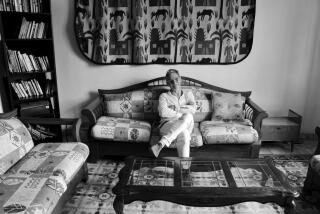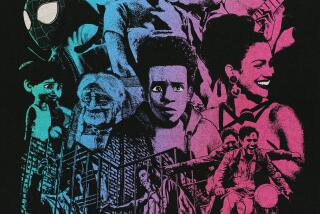Glory Days of a Tough Old Basque : Sporting life: Former jai alai champ Jose Garate, who now lives in San Diego, returns home this summer to be honored at the Barcelona Olympics.
- Share via
Ernest Hemingway did not write Jose Garate’s Hemingwayesque life.
Instead, Hemingway appeared among other supporting characters--kings, bullfighters, movie stars--in the adventures of a tough old Basque who roved the globe playing the tough old Basque sport of jai alai.
“It’s a violent game, a dangerous game,” said Garate, a courtly 85-year-old with shiny white hair, whose gravelly, Basque-accented Spanish sparkles with bits of Mexican slang. Garate held up a jai alai ball from the 1930s--a tool of the trade, cultural icon and rock-hard, high-speed weapon that left a dent in his skull.
“This ball hits you, and I’ve seen teeth fall out like this- tic tic tic tic tic ,” he said. “In my time, we played without a helmet. It made the game more beautiful, people could see your face, the expression. Now they all look the same, like they were made in a factory.”
This beautiful, dangerous game of peasants and fishermen took Garate from a poor mountain village to the 1924 Paris Olympics. He played on a Spanish national team that won a gold medal.
Sixty-eight years later, Spanish sports officials located Garate in comfortable retirement in San Diego. They have invited him to the Barcelona Olympics this summer as an honored guest and former pelotari (jai alai player). The sport will be featured as a demonstration event at the summer games, revived for the first time since Paris.
“They thought I was dead,” Garate said. “They invited me because, well, because I’m still alive.”
And still playing tennis. And still savoring a feast of memories from a high-rolling era when the professional jai alai universe extended from Shanghai to Brazil to Tijuana.
Jose Tasende, a fellow Basque who played jai alai in Tijuana in the 1960s and now owns a La Jolla art gallery, described Garate as a great friend and noted pelotari. Garate and his brother, Pedro, belonged to a generation that played the sport at its peak, Tasende said.
“He lived the classic era,” Tasende said. “Jai alai had a different category, a different significance. It has declined since then.”
Garate ate paella with Will Rogers in Miami. He survived the Japanese invasion of China. He boxed and drank poolside at the Havana beach house of the ultimate aficionado of Spanish culture, the novelist who revered athletic rituals that turn violence into art.
“Ernesto always invited us to his house,” Garate said. “He was a good man. He liked to hit the bottle. . . . . When he went on trips, he would leave us the keys to his house at San Francisco de Paula, it’s a museum now outside Havana, and he would tell us: ‘You can have any parties you want.’ He had a wine cellar full of top labels. We would take Cuban women there, live it up a little, but we never touched a bottle. When he came back we told him, ‘Ernesto, we never touched a bottle.’ And he would say: ‘Idiots! You are idiots!’ That was the way he was. A noble person.”
Garate was born in Villabona near the city of San Sebastian and the French border: a mountainous town of 3,000 people, most of them poor.
His father--later forced to retire from jai alai by a blow that damaged his sight and speech--taught him the traditional Basque game, which resembles handball or racquetball. It is played with a cesta , a scoop made of specially woven reeds, and a rubber ball, or pelota , that hurtles at speeds of 130 miles an hour on the court. The words “jai alai” mean “happy festival” in the Basque language; the current official title is pelota.
“I started playing when I was six,” Garate said. “By the time I was 16, the game didn’t have any secrets left for me.”
At 17, he was selected for the Spanish Olympic team, which beat the French team to win the 1924 Olympics. He came back and gave his gold medal to his fiancee. Then he lost both the girl and the medal to a future that lay far from home, on the professional circuit of front o nes (jai alai halls): he went from Barcelona to Miami, Brazil, Italy, Egypt, and an eight-year stint in China starting in 1932.
Garate and his brother played and partied well.
“It was a beautiful time. You traveled by ship. I crossed the Atlantic more than 40 times, and the Pacific,” he said. “They paid for our trips, they gave us everything, the best. We were like princes. What’s more, I didn’t get married until I was 40. These Basques always married Basque women when they were young, they had kids when they were 19. That was a disaster when you are traveling.
“Shanghai was a paradise for a single man. Havana was marvelous.”
Grim news invaded paradise in 1936: the Spanish Civil War had begun with the insurrection of General Francisco Franco. Fascist planes bombed Villabona, destroying Garate’s family home.
On April 28, 1937, came the tragedy of Guernica. The village near Bilbao had been a center of Basque nationalism, a holy city, since the Middle Ages. Garate had once been honored at a fiesta in Guernica as an amateur champion.
Franco dispatched bombers with orders to pulverize Guernica and everything it symbolized. They wiped out the place, but not the memory: The carnage was immortalized in the Picasso painting of the same name.
“That was our dream, Basque independence, and that’s why Franco destroyed Guernica,” said Garate, who remained in China during the war. “He was a man without a mother, as the Mexicans say. He was always surrounded by priests and bishops, going to Mass every day. I couldn’t stand that. . . . But the Republicans were with the Russians, the Communists and Socialists, so they started killing priests and nuns and burning churches. Nobody wins a civil war. . . . I did not go back until 1955. I did not see my beloved Spain for 23 years.”
He did see bloodshed, however. The Japanese invasion of 1937 found Garate in Tientsin; he watched dumbstruck one day as troops bayoneted a Chinese ball boy at the front o n. Soldiers briefly arrested Garate, but Belgian diplomats interceded and saved him from a prison camp.
“Poor kid,” Garate said. “I left China with a hatred of the Japanese. I told myself that the first Japanese I saw, I would beat the hell out of him. Then one forgives, one forgets.”
Garate spent the next decade playing in Miami, with frequent jaunts to the sleazy, glorious, non-stop carnival of 1940s Havana. Photos of the period show a dapper, sinewy man with hair slicked back in the classic style. He met a legion of celebrities, many of them through Hemingway: Errol Flynn, Ingrid Bergman, the legendary bullfighter El Cordobes, the doomed dictator Fulgencio Batista.
“Hemingway always invited me to his parties,” Garate said. “He told me, ‘Jose, you are a very good mixer.’ ”
In 1947, Garate met and married his wife, Virginia, who is from Indiana. They moved to Tijuana and he finished his career there. Although jai alai had become increasingly decadent from gambling and corruption, Garate says he resisted temptation.
“I have known pelotaris , they were 20, 22 years old, making $2,000 a month playing honestly, with a fantastic future. Then a gambler offers them $12,000 to throw a game. It was easy to throw a game. But then they fell into the habit. . . . I had sufficient intelligence to realize that if you add it up, you end up losing. You are blacklisted and you can’t play anywhere.”
The Garates and their daughter settled in San Diego. Through business connections, Garate embarked, somewhat tentatively, on a second career as a salesman of dental supplies. His market consisted mainly of Latino dentists. He grins sheepishly as he recalls forays through the Southwest, difficulties with clients who did not speak Spanish.
One Anglo dentist endured his sales pitch with an increasingly sarcastic expression. “Finally, he said, ‘Mr. Garate, I did not understand a word you said. But I’ll buy your product.’ ”
As the years have advanced, Garate has stayed vigorous. He survived open-heart surgery: “Too many steaks.” He travels to Spain every year. He plays tennis with cronies, Basque and otherwise. He is a fixture at a luxurious health club in San Diego where people greet him in the halls with cries of “Hey, Jose!” “Hey, campeon! (champion)”
When he takes the court, he seems stooped, fragile. But when he grips the racket, he suddenly moves like an athlete again, leonine reflexes kicking in, the ball whizzing across the net with speed and accuracy.
“I lack wind,” he says mildly. “I play more doubles than singles now, to tell you the truth.”
This year’s homage in Spain gives Garate a chance to celebrate his past, his sport and his country, whose bustling good fortune still astonishes him. His favorite hotel in Madrid has gone from $35 to $125 a night. His hometown jai alai club, founded long ago by fishermen and laborers, now boasts 500 members. They drive flashy cars, dress well, dine extravagantly.
“In my youth, the aristocracy dominated in Spain,” he said. “Now the working people live as well as they did. It is incredible.”
But Garate tries to remain true to his humble roots.
“I have met people from the top and people from the bottom,” he said. “I have met all kinds of people. I have always tried to help everyone I could. Money is important only if you don’t have it.”
Another event has coincided with Garate’s year of remembrance and rejuvenation: After falling into disuse, the downtown Tijuana jai alai palace reopened last month with a roster of new players. Many are Basques.
And Garate wants to see them play. He wants to cross the border and descend once more into the gritty arena of the past, where his countrymen still arrive in search of fortune, armed with cesta , pelota and their youth.
More to Read
Go beyond the scoreboard
Get the latest on L.A.'s teams in the daily Sports Report newsletter.
You may occasionally receive promotional content from the Los Angeles Times.






